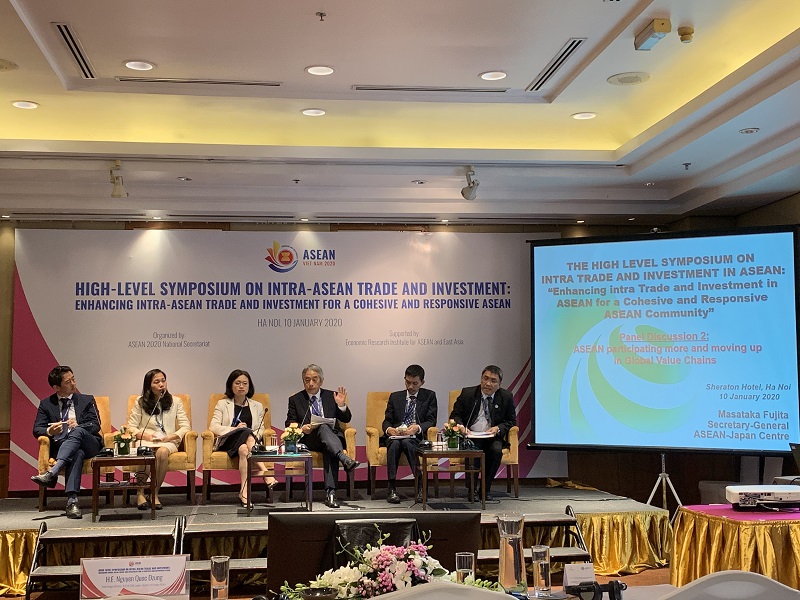 SG Fujita of the AJC (third from the right) participating in the High-Level Symposium on Intra-ASEAN Trade and Investment. From the left, Mr. Hirokazu Kobayashi, Executive Director, JETRO Singapore; Ms. Hoang Ngoc Anh, Acting General Secretary, Vietnam Textile and Apparel Association – VITAS; Mrs. Le Thi Hai Van, Deputy Director-General, Foreign Investment Agency, Ministry of Planning and Investment of Viet Nam; Mr. Masataka Fujita, Secretary General, ASEAN-Japan Centre; Dr. Nguyen Duc Thanh, Associate Professor, Founder and Director of the Viet Nam Institute for Economic and Policy Research (VEPR); and Atty. Allan B. Gepty, SEOM Leader of the Philippines (Photo: Business Wire)TOKYO, Jan 22 (Bernama-BUSINESS WIRE) --
SG Fujita of the AJC (third from the right) participating in the High-Level Symposium on Intra-ASEAN Trade and Investment. From the left, Mr. Hirokazu Kobayashi, Executive Director, JETRO Singapore; Ms. Hoang Ngoc Anh, Acting General Secretary, Vietnam Textile and Apparel Association – VITAS; Mrs. Le Thi Hai Van, Deputy Director-General, Foreign Investment Agency, Ministry of Planning and Investment of Viet Nam; Mr. Masataka Fujita, Secretary General, ASEAN-Japan Centre; Dr. Nguyen Duc Thanh, Associate Professor, Founder and Director of the Viet Nam Institute for Economic and Policy Research (VEPR); and Atty. Allan B. Gepty, SEOM Leader of the Philippines (Photo: Business Wire)TOKYO, Jan 22 (Bernama-BUSINESS WIRE) -- Secretary General of the ASEAN-Japan Centre (AJC), Mr. Masataka Fujita was invited to the High-Level Symposium on Intra-ASEAN Trade and Investment: “Enhancing Intra-ASEAN Trade and Investment for Cohesive and Responsive ASEAN Community”, which was held in Hanoi, Viet Nam, on 10 January 2020, to share his views on the current situation of intra-ASEAN trade and investment with a focus on growing ASEAN’s participation in the Global Value Chains (GVCs).
The Symposium was one of the first official events of ASEAN 2020 since Viet Nam assumed the Chair of ASEAN; and organized by the Viet Nam’s Ministry of Foreign Affairs in coordination with the Ministry of Industry and Trade, and Ministry of Planning and Investment. It was attended by some 120 distinguished guests and participants including former and incumbent ministerial level officials from some ASEAN countries, officials attending Senior Economic Officials Meeting (SEOM) from all the 10 ASEAN Member States, as well as delegates and experts from the ASEAN Secretariat and other regional and international organizations. Against the background that the situation of intra-ASEAN trade and investment are relatively modest compared to the other economic groupings, and with the conviction that enhancing intra-ASEAN trade and investment will contribute to realize ASEAN priorities and a cohesive and responsive ASEAN Community, the symposium discussed three kinds of issues, namely, removing institutional and policy barriers, moving up along GVCs and improving seamless logistics. It was aimed at coming up with policy recommendations to be reported to SEOM and ASEAN Economic Ministers’ Meeting in 2020 for further consideration.
SG Fujita participated in the panel discussion entitled “ASEAN participating more and moving up in Global Value Chains.” In his talk, he gave a general picture of the GVCs in ASEAN; and shared his views, with reference to AJC’s research work, on how ASEAN can participate more in the GVCs and how it can move up its GVCs, based on the data of value-added trade. He emphasized that the ASEAN Member States should participate in the GVCs as there is positive relationship between the GVC participation and GDP per capita growth rate; i.e. if a country participates more in the GVCs, the country tends to have higher opportunity to have higher GDP per capita growth. He further explained that there is also a positive relation between GVC participation and volume of foreign direct investment (FDI): namely, the more a country receives FDI, the country has more chances to participate in the GVCs; and recommended the ASEAN Member States to strengthen and improve their measures to attract it further.
Having explained this, SG Fujita proposed the five policy points for the ASEAN Member States to gain access to GVCs, benefit from GVC participation and realize opportunities to upgrade in GVCs for further economic growth of the region. The policy points include (1) Embedding GVCs in overall development strategies and industrial development policies; (2) Enabling GVC growth by maintaining a conducive trade and investment environment and by putting in place infrastructural prerequisites; (3) Building productive capacities in local firms; (4) Mitigating the risks involved in GVC participation, which requires a strong environmental, social and governance framework; and (5) Aligning trade and investment policies, which implies the identification of synergies between the two policy areas and in relevant institutions.
Upon participating in the symposium, he appreciated ASEAN policy makers’ keen interest in AJC’s study on the GVCs. “I hope our recommendations could be of any help for the ASEAN to increase GVC participation and moving up along as well as shifting up its GVC, as it is an important strategic option for ASEAN since it moves towards achieving the ASEAN Economic Community (AEC) Blueprint 2025 with its characteristics of ‘a highly integrated and cohesive economy’ and ‘a competitive, innovative and dynamic ASEAN’”, he said.
AJC is an intergovernmental organization established by the ASEAN Member States and Japan in 1981, with objectives to promote trade, investment, tourism as well as people-to-people exchanges between the ASEAN Member States and Japan.
Official Website of the ASEAN-Japan Centre:
https://www.asean.or.jp/en/ AJC's papers:
https://www.asean.or.jp/en/centre-wide/centrewide_en/ Photos/Multimedia Gallery Available:
https://www.businesswire.com/news/home/52160169/enContactJunko Nukiyama
Office of the Secretary General
ASEAN-Japan Centre
Tel: +81-3-5402-8118
E-mail:
toiawase_ga@asean.or.jpSource : ASEAN-Japan Centre
--BERNAMA